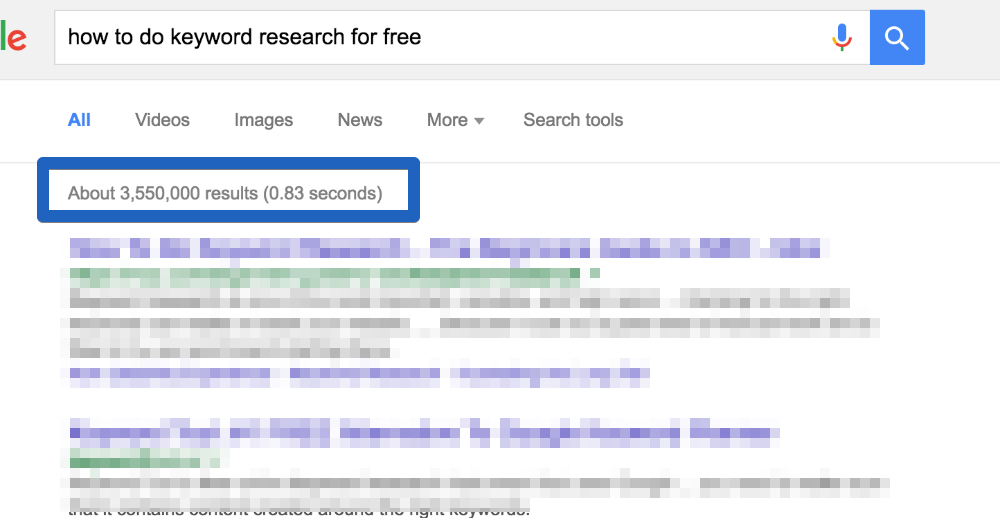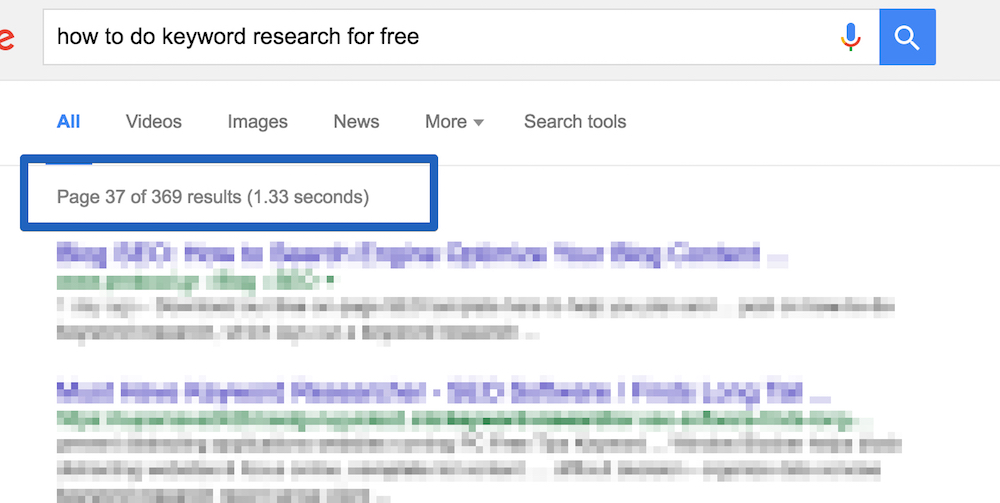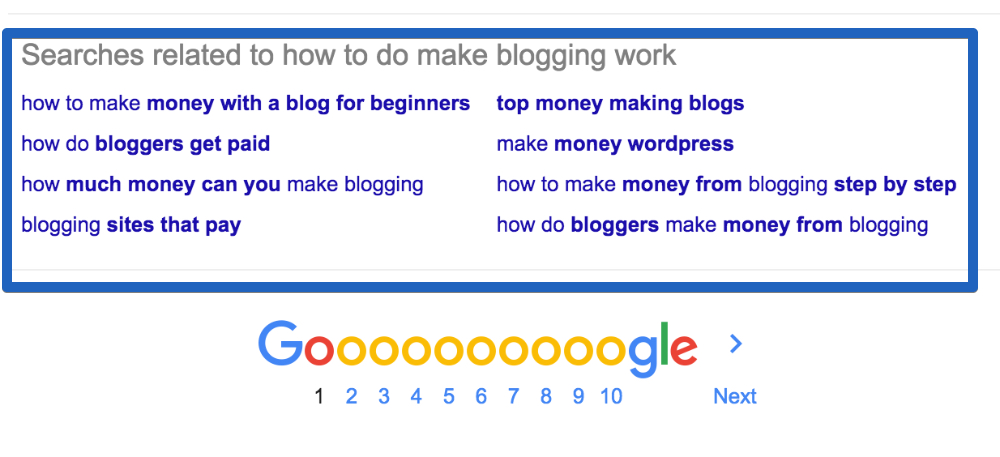Learning about keywords?
That is great as most newbie bloggers tend to disregard keyword research altogether, which is a horrible mistake to do; especially when you’re first starting out.
If you’re new to this, make an effort to target the right keywords as much as you can as this is one of the shortest, fastest ways you can start getting high-quality targeted visitors to your site.
The thing is, most people don’t even know what keywords are and what they do, never mind how to use them and how to find them.
This guide will hopefully give you a clear insight on what keywords are, how to use them and how to do keyword research for free (usually proper keyword research involve buying into paid tools) but I will be sharing with you some techniques to get some data for free.
How To Do Free Keyword Research

First; Make Sure You Understand Keywords
Keyword research and what keywords can be used for is a whole subject that I surely can’t cover in one blog post but the essentials you need to understand about keywords are these:
Keywords are what people use to find information online on Google (or any other search engine); but we’ll focus on Google today as it’s the big player in this.
As a blogger, content marketer and online e-preneur, you need to find what your audience are interested in learning about and write about that and the only way to do that is to do keyword research.
At this point in time, I want you to forget completely the false information I sometimes see online (and I’m sure you saw it as well) and that is the advice of :
“Build it and they will come.”
Sorry, no it doesn’t work that way especially if you’re a beginner. I can see authority bloggers and companies working at that angle and succeeding, but since (I’m assuming) you’re a newbie blogger just getting started, then this advice does not apply for you.
Think of it this way; if you want to go fishing, you go where you can find fish right?
Same with keywords.
By finding out what keywords your audience are typing into the engines everyday, you can create content that gets in front of their eyes using simple and practical SEO advice I’ll also be going through in this guide.
Once you have enough content in front of enough people’s eyes. You will, by 100% guarantee start seeing:
- Visitors coming in,
- Visitors sharing your content,
- Visitor leaving comments and yes;
- Visitors making you money.
Keywords research is also very important when you’re doing affiliate marketing as you are targeting content for people that want to buy.
I won’t go into that here, but you can see my guide on how to do keyword research for affiliate marketing.
How To Find Keywords For Free
Finding keywords is not the hard part; every little thing typed into Google is a keyword.
Just look at you recent 20 searches and each one of them is a keyword you typed in hoping to find the information you were looking for.
Now, whether you found the right information is irrelevant, that’s up to Google to decide which content ranks first and they decide that with these 200+ factors.
However, while finding keywords is easy, you do not want to target just any keyword.
It’s ok to do this every once in awhile, nowadays I don’t write much with keywords in mind (although I still pay very close attention to my SEO).
If you’re starting out though, it’s best to find keywords that people are looking for.
A perfect example of this is my recent project 3hundrd.com.
I have done no social media promotion and even my list on there is nowhere near enough to generate traffic: all I have used in the past 7 months is SEO, with the use of (free) keywords, this has been my result so far;

What Does A Great Keyword Look Like?
Ideally, you will be able to find keywords that have these “characteristics” to them:
A good number of searches:
Ideally, you target keywords that get over 100+ searches. You can go for lower or higher of course but in many cases; when you target highly searched keywords, there’s also going to be a lot of competing pages for that term, thus; it’s best to avoid (for now).
With 100 searches a month, low competition (we’ll learn about that soon) and a great post to target that keyword, you can easily rank on page 1 which means you’re going to be getting at least 10% of the readers (and that’s bare minimum).
10 readers a post x 100 posts = 1000 readers every day, 30,000 per month (more than enough to make some serious cash online)
Low competition:
Competition is obviously everywhere online, but competition means that there is a market for that keyword (niche) and money can (and is) being made within that space.
Competition is good, actually great, but too much competition is too hard for a newbie to compete with.
That is why it’s super important also to dig deep into a niche, and not be too broad.
The “health” niche is super broad and you have a very, very, very low chance of succeeding. However the niche; “how to lose belly fat for older man” is a much more workable niche and with that keyword you can be on the number one page with ease.
What is a good number of competing pages?
Ideally, you would want less than 100 competing pages for the exact search term. If you type in a keyword into Google, they will say they have found “3 million something results” but if you know how to do your keyword research, you will find that it’s really much, much lower than that.
Here is how that works:


(the data from example 2 (which is the correct number of competing pages) can only be found when you go to the very last page of the Google pages (usually around the 30+ page mark).
Anything below 100 competition pages is a good way to start. Obviously, 120 competing pages is not bad either so make sure you gauge the context of the whole thing.
Also, you can definitely target keywords that have a lot of competition, just do not expect to hit the #1 spot anytime soon. It is possible to over time; slowly but surely climb up the ranks especially if you’re getting a lot of comments and social shares on on the post.
For one day, and this was incredible, I ranked under the search term “amazon” on page #1 in the 3rd listing.

I never thought that was possible but that post, which you can see right here, has over 60,00 shares and hundreds of comments.
Since we’re on the subject about this, I should let you know that from all those impressions I got for ranking on page 1 for the term “Amazon”, I didn’t get a single click!
Why?
Because my guide is about how to make money as an amazon associates so the people that were typing “amazon” in the SERPS, only wanted to visit Amazon to do some shopping or browse products.
My post had nothing to offer these people so nobody clicked, then Google dropped me from the #1 page after a few hours.
Just goes to show that a lot of searches doesn’t mean it’s going to instantly drive in huge amount of traffic either, you have to target the right keywords for the right people. Otherwise; you’ve lost!
Keyword Makes Sense
A keyword also needs to make sense, doesn’t have spelling mistakes and can be read “naturally”.
Examples:
“How to do keyword research” is a great keyword that has no spelling mistakes, can be read easily and makes sense when read.
“How 2 do keyword risearch” (typos on purpose) is not a good keyword.
Even though you will find that a term with spelling mistakes or that doesn’t make sense gets a lot of searches and has no competition, it doesn’t mean that you should target it either.
Google is smart, and it’s getting smarter everyday so they quickly pick up on these things and will still show results based on the proper term of the keyword, thus the first example used.
Do you get my point here ?
How To Find Free Keywords (with data as well)
Ok, now that we’ve talked about what makes great keywords and what they usually look like, it’s time to find out how to find these keywords, along with their data and (if possible); for free, which is what this whole blog post is about.
For that, and especially if you want to do it for free, it’s going to take a little bit of work but (with these free methods), you should be able to get enough keywords to get you going.
NB: Although this is a post on how to do keyword research for free, I highly encourage you to invest in a premium keyword tools such as Jaaxy once you think is necessary / can afford it.
The benefits of having a premium keyword tool will save you a tremendous amount of time and will give you a much more clearer, workable data to use.
Following are some ways you can do keyword research for free to get you going:
The “Alphabet Soup” Technique.
While you will not be getting exact numbers with this technique, it’s a guarantee that you will be targeting keywords that people are looking for.
Have you ever gone to Google, started typing something and Google made a suggestion for you?
Google is showing you which keywords people are looking for when they type a keyword similar to what you are typing; thus we get what is called The Alphabet Soup technique.
It’s called the alphabet because you can go through the alphabet (starting from A, B, C and so on and for every letter you enter, Google will take a guess of what you’re looking for.
There are 26 letters in the alphabet and if you get just 1 idea from each “letter”, that’s already 26 keyword ideas that we know people are typing into Google.
Those 26 keywords can then be turned into individual blog posts that will keep you busy writing for months!
Not just that either, Google also comes to the rescue when you type in your search and scroll all the way down to them bottom.
These are also keywords that you should keep in mind, write and individual article about or even use them as sub-titles in your keyword specific post.

The Google Adwords Tool
This nifty little tool is your only hope at getting data for free at anytime you want but; there is a catch involved.
You’re going to need to have an Adwords account.
This is a simple thing to do so don’t worry. All you have to do is register with Adwords and you’ll be given their keyword tool.
Now people may assume that since this tool is operated by Google, then the data must be legit and accurate, but you’ll be wrong.
I may be wrong about this, but I have heard others report how inaccurate (and over inflated) Google Adwords is. Some even go the length of saying that it’s a “conspiracy” by Google to inflate the searches and lower the competition just so people use Adwords even more with more confidence.
I won’t back that up, but I will say that I have used the Google Keyword Tool in the past and I never had any issues. Surely it’s not 100% correct, that’s impossible; but for doing keyword research for free, it’s a good place to get started at.
Jaaxy (the Keyword Tool)
The other (and last) tool I will recommend is using the Jaaxy keyword tool which is the only tool I am using right now.
Why have I made this my go-to tool?
Because it gives me everything I need. I can even check my rankings for specific keywords on Jaaxy.
It also gives you the competition, SEO power, search for affiliate programs around that keyword and; it gives you more ideas that are related to your niche.
It’s kind of the Alphabet Soup technique + a keyword tool that is backed with data.
Also, Jaaxy shows data for global searches (not just the US) on all the major search engines (Google, Bing & yahoo) so you will be getting a much clearer idea of what you can expect with regards to traffic.
I have to tell you though, and this may come as a bit of a disappointment, but Jaaxy is a paid service. It costs $19 a month to use (which is a great value for money) BUT; you can get your first 20 searches for free here.
By typing in the right keywords and looking at what other keywords it recommends, you should have enough content ideas and keywords planned to get you going and ranked quickly.
Some other keyword tools that I can also recommend are these, but please note some of them may have premium membership involved:
- SEM Rush
- Long Tail Pro
- Keyword Spy
- Word Tracker
- Market Samurai
- SpyFu
While I do suggest you try some of these other tools, I also have to say a little disclaimer here that I have not used these products / tools myself so I am not so sure what and how they deliver their data.
In Closing
Thank you for reading so far down this post, I know this has dragged on a bit but knowing how to do keyword research for free is something I would’ve loved to known about when starting out.
While I did use the Google Keyword Tool, I did experiment with other not-so recommendable tools that promised me to make me quick success (but I won’t go into that now).
However, I am sure that the information I provided today + the tools I recommend are going to help you understand better:
- What keywords are,
- What they do and,
- How to find them for free.
All is left to do now is write your first post and if you’re having any issues with that, I’d like to refer you to my guide on writing your first blog post.
Also, since we’re on the topic of “keyword research” here, you can also check my previous guide where I go more in depth about keywords.
Hope this has been helpful to you. If so, please do give this post a share and also do not hesitate to leave a comment if you wish. I appreciate all feedback and if you have any questions, I’ll be sure to answer them asap.
Till next time.
Chris Lee
PS: Don’t forget to sign up to my email list so I can send you my free ebook “How To Win At Affiliate Marketing” and also send you an invite to try out my #1 rated online marketing training course.


In fact, I think you cannot rely on anyone Keyword Research tool as such because, in the long run, the search behavior keeps on changing and also fluctuates from country to country. Keeping all options open for a global traffic and targeting for the maximum possible targeted keyword phrases should be the aim for the keyword research phase.
Instead of focusing on only the keywords recommended by keyword research tools and Adwords also concentrate on the possible psychologies of users from various geographic areas unless you are concentrating only on a very particular area where only the language and slang of that place concerns for the search of that site. Online users from different places, of different age groups and the various educational backgrounds, think differently and use different language and jargon.
Instead of focusing on only specific fixed key terms we should work to keep the possibilities of a wider circle of permutations and combinations of key phrases open for the site. The analytics data, in fact, can give a proper meaning of what searches are actually taking place countrywide.
Anyways, very informative article. Delivers some great points to light…
Hi,
Wow! This is a great guideline I ever read on online about keyword research. Surely, This Guideline will help novice marketers to learn how to research keywords perfectly. I am eagerly waiting for your next upcoming post.
Thank you very much Davis 🙂
Yes Keyword research is very important for every commercial website.
After google adwords update on keyword planner I am using SEM Rush.
Yep also a very good tool Kelly. I’ve used it on and off myself as well! Thank you for your kind comment.
Talk soon! 🙂